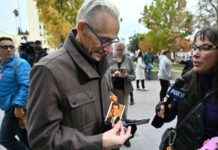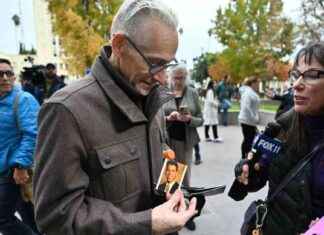Under pressure from Ukrainian counter-offensives, Russia has announced the withdrawal of troops from eastern Ukraine. Soldiers should be withdrawn from the Kharkiv region, for example from the strategically important city of Izyum, Defense Ministry spokesman Igor Konashenkov said in Moscow on Saturday. The Russian troops are also to withdraw from the city of Balaklija, which the Ukrainians had reported as liberated last week.
The official justification for the withdrawal was that the regrouping should strengthen the units in the neighboring Donetsk region. However, many military experts assume that more than six months after the start of the war, the Russians came under so much pressure in view of the massive Ukrainian advance in the Kharkiv region that they decided to flee.
Earlier on Saturday, the Ukrainian side reported about the recapture of Kupyansk. Because of its direct rail connection to Russia, the small town is important as a transport hub for supplying the entire Russian military unit around Izyum in the south-west. With the advance of the Ukrainians, more than 10,000 Russian soldiers would have been threatened with encirclement.
Later, the military governor of the eastern Ukrainian region of Luhansk, Serhiy Hajday, reported that their own troops were also advancing there and had already advanced to the outskirts of Lysychansk. Lysychansk was the last major city in the Luhansk region to be conquered by the Russian army in July. Before Russia invaded Ukraine at the end of February, the industrial city had almost 100,000 inhabitants.
The Ministry of Foreign Affairs in Kyiv said Ukrainian units were advancing in eastern Ukraine and liberated “more towns and villages”. The “courage” of the soldiers “paired with military support from the West” is delivering “impressive results,” Foreign Ministry spokesman Oleh Nikolenko wrote in online networks. It is “of central importance” to continue to supply arms to Ukraine. Defeating Russia means “winning peace in Ukraine”.
The peace commissioner of the Evangelical Church in Central Germany (EKM), Jens Lattke, has called for the consequences of military force in the sense of a “just peace” to be considered in view of the war in Ukraine. There are alternatives to war: “The end of peace must not be the end of peace policy,” he said on Friday at a German-American meeting of the Evangelical Church of Westphalia in Schwerte-Villigst.
It cannot be the task of the church to legitimize military force, “even if we do not know how to end force”. Nonviolent resistance, civil disobedience, support for civil society structures and negotiated solutions are the better options.
According to Polish Prime Minister Mateusz Morawiecki, Ukraine is fighting for the future of all of Europe. “We can ask ourselves what this war is really about. This war is about the future shape of Europe,” Morawiecki wrote on Facebook on Saturday after his return from Kyiv. This future must be free from Russian imperialism and colonialism, from blackmail and from the Kremlin’s desire for conquest, wrote Morawiecki after his meeting with Ukrainian President Volodymyr Zelenskyj and Prime Minister Denys Schmyhal.
The former chief rabbi of Moscow, Pinchas Goldschmidt, calls the Ukraine war a total catastrophe for Russia and also for the Jewish communities there. “A large part of the Jews have already left the country, others are sitting on packed suitcases,” Goldschmidt told the “Tagesspiegel”: “We are back in a new Soviet Union.”
However, the war did not affect the relationship between Russian and Ukrainian Jews. In the past six months, around 15,000 Jews from Ukraine and 25,000 Jews from Russia have emigrated to Israel. “We help each other where we can. The policies of the governments in Kyiv and Moscow do not affect our solidarity,” said the 59-year-old.
Federal Foreign Minister Annalena Baerbock was shocked during a visit by deminers in Ukraine. “What I see here is more than frightening,” says Baerbock. It is obvious that “not only anti-tank mines were deliberately laid here, but also anti-personnel mines, i.e. mines were specifically used by the Russian army to kill civilians,” says Baerbock.
Specialized forces from the air force and navy are to train in Estonia to protect the critical infrastructure of the eastern NATO partner. According to information from the German Press Agency, more than 150 soldiers from Germany will take part in the “Baltic Tiger 2022” exercise in October. The training program also includes securing communication routes and troops “on the march”, as may be necessary when relocating reinforcement forces. The joint exercise with Estonian associations is planned in the greater area of the capital Tallinn and the NATO airfield Ämari. After the Russian attack on Ukraine, NATO wants to ensure increased protection for allies on the eastern flank. The exercise should now be a clear signal of reinsurance.
According to President Volodymyr Zelenskyy, Ukrainian troops have recaptured more than 30 settlements in the eastern Ukrainian region of Kharkiv. “We are gradually taking control of new settlements,” said Zelenskyy in a video address on Friday evening. “Everywhere we are bringing back the Ukrainian flag and protection for our people.” Both in the Donbass in eastern Ukraine and in the south of the country, “bitter fighting” continued, the president said.
According to Ukrainian President Volodymyr Zelenskyy, the Turkish defense company Baykar is planning to build a factory for drones in Ukraine. “We discussed the details of the construction of a Baykar factory in Ukraine and the production of new goods using Ukrainian components,” Zelenskyy writes in an online post after meeting with the group’s head Haluk Bayraktar. Baykar’s TB2 drone is very popular in Ukraine, having contributed to the destruction of numerous Russian artillery systems and armored vehicles.
In view of an ongoing Ukrainian counter-offensive, the Russian occupiers say they are evacuating other places in the eastern Ukrainian region of Kharkiv. First, the towns of Izyum and Kupyansk are to be cleared, as the head of the military administration deployed by Russia, Vitaly Gantchev, said on Friday, according to the state news agency TASS. The town of Welykyj Burluk is also under fire, where the civilian population is also to be taken to safe places. The Russians had already reported on the evacuation of Kupyansk on Thursday.
The head of the International Atomic Energy Agency (IAEA), Rafael Mariano Grossi, has warned of an increasingly dangerous situation at the Zaporizhia nuclear facility in Ukraine. “This is an unacceptable situation,” said Grossi. He called for an immediate cessation of shelling in the area of the nuclear facility and immediate establishment of a protective zone around it. “It’s the only way to make sure we don’t have a nuclear accident.”
Grossi stated that it was unlikely that reliable external power connections would be restored to the nuclear facility. “The nuclear plant has no external electricity. And we have seen that the infrastructure is damaged again as soon as it is repaired,” Grossi shared. “This is absolutely unacceptable. That can not be.”
The plant, with its six reactors, came under the control of Russian forces at the beginning of the Russian war in Ukraine. However, it will continue to be run by the Ukrainian workforce. The nuclear power plant and the surrounding area were repeatedly shelled, for which the Russian and Ukrainian military blamed each other.
NATO Secretary General Jens Stoltenberg has cast doubt on Germany’s arguments against supplying large quantities of Bundeswehr weapons to Ukraine. When asked whether the Allies should meet the Alliance’s capability targets rather than supplying Ukraine with more equipment, the Norwegian made it clear that he considers Ukraine’s defeat to be more dangerous than NATO countries’ weapons depots filled below plan.
“By making sure that Russia doesn’t win in Ukraine, we also increase our own security and strengthen the alliance,” Stoltenberg said at a press conference with US Secretary of State Antony Blinken. The use of NATO countries’ weapons stocks helps to reduce the risk of aggressive action by Russia against NATO countries. More than 80 percent of Russia’s land forces are currently tied up in the war in Ukraine.
Stoltenberg expressed himself very differently from Defense Minister Christine Lambrecht (SPD). At the end of August, it made it clear that it saw little opportunity to send weapons from Bundeswehr stocks to Ukraine for defensive purposes against Russia. “I have to admit, as Minister of Defense, (…) we are reaching the limits of what we can give away from the Bundeswehr,” she said at a cabinet meeting in Meseberg near Berlin. The Bundeswehr must be able to guarantee national and alliance defense. As Minister of Defense, she will make sure that this continues to be the case.
According to Czech information, the European finance ministers support a five billion euro loan package for Ukraine. This should enable the state attacked by Russia to cover its expenses. The sum is part of a package worth nine billion euros that was announced in May. The first billion was paid out in August.
According to the Czech Ministry of Finance, it should now be decided how the remaining three billion euros should be divided between loans and grants. The Czech Republic holds the EU Council Presidency.
CDU leader Friedrich Merz calls on the federal government to supply Ukraine with more weapons. “Together with the FDP and the Greens, I would have granted an export permit for 100 Marder armored personnel carriers for the Ukraine,” said Merz at the CDU federal party conference.
He said to critics of the arms deliveries: “If Russia keeps the guns silent, the war will be over. When Ukraine lays down arms, the country’s territorial sovereignty will end – that’s the difference.”
Kharkiv city center was hit by Russian missiles on Friday. Ten people were injured, including three children, writes the governor of the region of the same name, Oleh Synehubov, on Telegram. Rockets have hit a school and an art center for children, Ihor Terekhov, the mayor of Ukraine’s second largest city, also said on Telegram. Residential houses were also hit.
The US wants to put Ukraine in a strong diplomatic negotiating position amid its ongoing counter-offensive against Russia. “We see no signs at this moment from Russia that it is ready to engage in such diplomacy seriously. But when that time comes, Ukraine must be in the best possible position,” US Secretary of State Antony Blinken said in Brussels after a meeting with NATO Secretary General Jens Stoltenberg.
Blinken praised the Ukrainian offensive and land gains in the south and east of the country: “It’s still in its infancy, but it’s demonstrably making real progress.” However, it is still too early to say how the situation will develop. However, Blinken emphasized that he sees big differences in the morale of soldiers from Ukraine and Russia. While Ukrainians are fighting for their freedom, many Russian forces have “no idea” why they are in Ukraine.
According to NATO Secretary General Jens Stoltenberg, the war in Ukraine is entering a “critical phase”. Thanks to support from NATO countries, Ukrainian armed forces were recently able to stop Moscow’s offensive in the Donbass and recapture territory, the Norwegian said at a press conference with US Secretary of State Antony Blinken. At the same time, however, the unity and solidarity of the West would now be put to the test. Stoltenberg cited the problems with the energy supply and the rising cost of living as a result of the Russian war as the reason.
According to the NATO Secretary General, it is now important that these consequences of the war do not lead to a reduction in commitment to Ukraine. “The price we pay is measured in money. The price Ukrainians pay is measured in lives,” he said. In addition, there will be an even higher price to pay when Russia and other authoritarian regimes realize that aggression is rewarded.
“When Russia stops fighting, there will be peace. If Ukraine stops fighting, it will no longer exist as an independent nation,” Stoltenberg said. Therefore, one must stick to the current course – “for Ukraine’s sake and for our own sake”.
The Russian army is sending armored vehicles and cannons to reinforce the Kharkiv region in north-eastern Ukraine in response to the Ukrainian counter-offensive. This was reported by Russian news agencies with reference to images from the Ministry of Defense.
Moscow-appointed Kharkiv region chief Vitaliy Ganchev said on television there was “violent fighting” near the town of Balakliya, which Ukraine reported on Thursday had recaptured. “Reserves from Russia were sent there,” he said.
The Kharkiv region has been partially occupied by the Russian army since the first days of the Russian war of aggression from February 24.
According to US Secretary of Defense Lloyd Austin, Ukraine is making progress in its ongoing counter-offensive against the Russian attackers. “We’re seeing successes in Kherson now, we’re seeing some successes in Kharkiv – and that’s very, very encouraging,” the ex-general said on the sidelines of a visit to Prague.
When asked why the US did not supply the Ukrainians with missiles even longer than the existing Himars missiles, Austin answered evasively. “We remain committed and make sure we give them what they need to be successful,” said the 69-year-old.
The talks in Prague were about increased defense cooperation between NATO partners the USA and the Czech Republic. After meeting his Czech colleague Jana Cernochova, Austin said both sides are interested in concluding a corresponding agreement “as soon as possible”.
The war in Ukraine caused damage of at least 97 billion US dollars (around 96.4 billion euros) in just the first three months. This emerges from a joint report by the Ukrainian government, the World Bank and the European Commission. The period from the beginning of the war on February 24 to June 1 was taken as the basis for the calculations. The most affected sectors are therefore housing (40 percent), transport (31 percent) and trade and industry (10 percent). The areas of Donetsk, Luhansk and Kharkiv are considered to be the most severely damaged.
Financial losses from the war during this period are reported at nearly US$252 billion (US$250.3 billion). The high amount comes about because losses in one sector affect other sectors. For example, the decline in agricultural production is affecting transportation needs, while the loss of electricity is affecting trade and industry, the report said.
The cost of rebuilding Russia-attacked Ukraine was estimated at at least $349 billion as of June 1. The most money is needed for the reconstruction of the transport system (21 percent), the demining and disposal of explosive remnants of the war (21 percent) and the demolition of housing stock (20 percent). In the short term, around 105 billion US dollars (around 104.3 billion euros) would be needed, also to make provisions for the upcoming winter.
As of Monday, Russian citizens will no longer benefit from easier visa issuance for trips to Germany and other countries in the Schengen area. On Friday, the Council of EU States accepted the European Commission’s proposal to completely suspend the agreement concluded between the EU and Russia to facilitate the issuing of visas.
According to earlier information from EU foreign policy chief Josep Borrell, the move will ensure that the number of new visas for Russians will drop significantly. In particular, people in need of protection should still be able to get a visa. The Schengen area includes 22 EU countries and four other European countries.
Specifically, the decision will increase the application fee for a visa from 35 to 80 euros. In addition, more paperwork is required, processing times are increasing and the issuance of multiple-entry visas is being restricted. In order to prevent disadvantages for journalists, dissidents and representatives of civil society, for example, the EU Commission has already announced additional guidelines.
Polish Prime Minister Mateusz Morawiecki made a surprise trip to Kyiv. There he will discuss the geopolitical situation, military developments and energy security with the Ukrainian side, said his government spokesman Piotr Müller on the Polsat television channel. He is also attending a conference. For the politician from the national-conservative Law and Justice Party (PiS), it is the third visit to the neighboring country’s capital since Russia’s war of aggression against Ukraine began.
For security reasons, information about the visit was delayed. The trip will not bring any far-reaching changes, but should be understood as a political signal to the Kremlin, emphasized Müller. “Defending Ukraine is also defending our security,” the government spokesman said. At the same time, he admitted that the situation on the Ukrainian eastern front continued to be difficult. In addition to Morawiecki, former Polish President Aleksander Kwasniewski also left for Kyiv on Friday.
According to Ukrainian sources, a Russian airstrike hit a hospital in the north-eastern Sumy region. The building was destroyed in the morning and several people were injured, said the governor of the region, Dmytro Schwyzkji, on the short message service Telegram. The hospital is located in the Velyka Pysarivka district, which borders with Russia. The airstrike was launched across the state border. The Russian government repeatedly denies that civilian targets are being targeted.
According to the United Nations (UN), Russia denies access to Ukrainian prisoners of war. There is also evidence of torture, says Matilda Bogner, head of the UN mission to monitor the human rights situation in Ukraine. “The Russian Federation has not granted access to prisoners of war held on its territory or in areas under its occupation,” Bogner explained to the press in Geneva.
“This is all the more worrying as we have documented cases of torture and ill-treatment of prisoners of war held by the armed forces of the Russian Federation or by armed groups associated with it in the sphere of the Russian Federation.” Russia denies torture or other ill-treatment of prisoners of war.
Hungary has spoken out clearly against a price cap on Russian gas. This is against European and Hungarian interests, the Eastern European country’s foreign minister, Peter Szijjarto, said in a Facebook video ahead of the special meeting of EU energy ministers on skyrocketing energy prices. A price cap would lead to an immediate halt to Russian energy supplies.
Hungary is particularly dependent on Russian oil and gas supplies. Russia has recently stopped the flow of gas to most European countries – with reference to the Western sanctions after the Russian attack on Ukraine. However, the Russian company Gazprom had started to expand its deliveries to Hungary in August.
In the past, Hungary – as one of the few countries in the EU – has sharply criticized the sanctions against Russia. They are not suitable for really weakening the government in Moscow, but they threaten to destroy the European economy.
“Kick-off Politics” is WELT’s daily news podcast. The most important topic analyzed by WELT editors and the dates of the day. Subscribe to the podcast on Spotify, Apple Podcasts, Amazon Music or directly via RSS feed.








